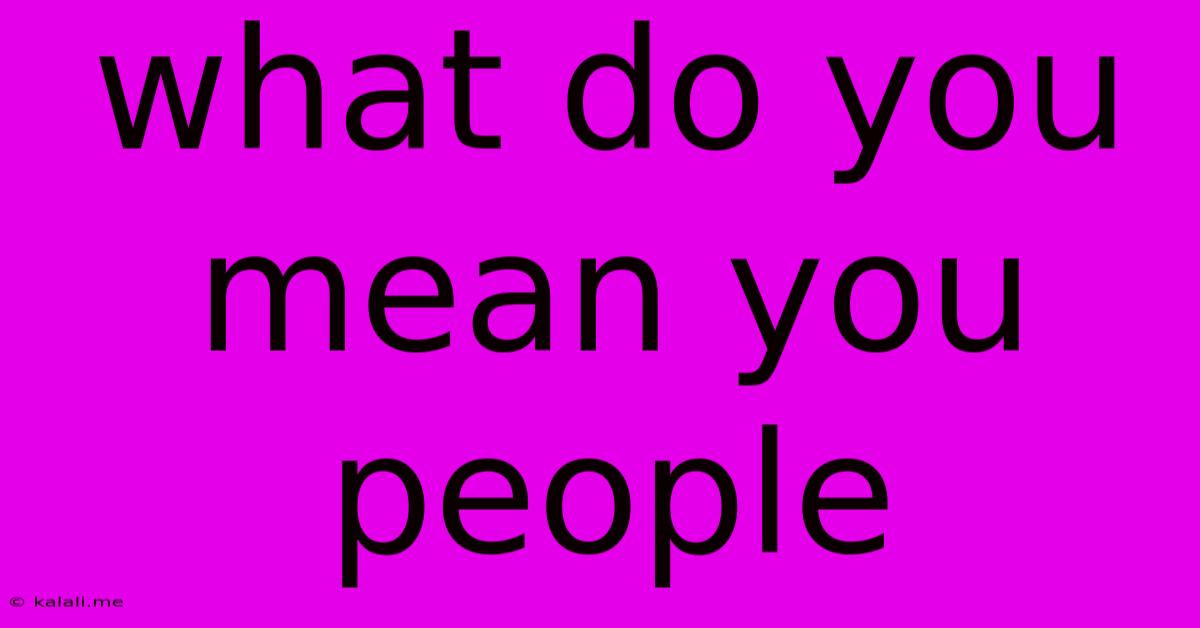What Do You Mean You People
Kalali
May 24, 2025 · 3 min read

Table of Contents
What Do You Mean, "You People"? Deconstructing a Phrase Loaded with Bias
The seemingly innocuous phrase "you people" often carries a heavy weight of unspoken assumptions and historical baggage. While it might appear to be a simple way to address a group, its usage frequently signals exclusion, othering, and even hostility. This article delves into the reasons why this phrase is problematic and explores more inclusive alternatives.
Why "You People" Is Problematic:
The problem with "you people" isn't necessarily the words themselves, but the context and implied meaning. The phrase subtly suggests a distinction – a separation between "us" and "them." This "them" is often a marginalized group, be it based on race, ethnicity, religion, sexual orientation, or any other social identity. The seemingly casual use of the phrase can unintentionally, or intentionally, reinforce stereotypes and prejudices.
Here's a breakdown of why it's so offensive:
-
Dehumanization: Using "you people" strips individuals of their individuality. It lumps them into a homogenous mass, ignoring their unique experiences and perspectives. This process of dehumanization can make it easier to justify prejudice and discrimination.
-
Othering: The phrase creates a clear "us vs. them" mentality, reinforcing the idea that the speaker and the group being addressed are fundamentally different and separate. This "othering" can lead to feelings of alienation and exclusion.
-
Historical Context: The phrase has a long and disturbing history, often used in a derogatory manner to target and belittle minority groups. This historical context imbues the phrase with negative connotations, even when used without malicious intent.
-
Power Dynamics: The use of "you people" often reflects an underlying power imbalance. It's frequently employed by those in positions of authority or privilege to address those who are marginalized and less powerful.
More Inclusive Alternatives:
Instead of using "you people," consider these alternatives that promote inclusivity and respect:
-
"Everyone," "All of you," or "You all": These phrases are neutral and inclusive, addressing the group without creating a sense of separation.
-
Specific group identification: If addressing a particular group, use their specific identifier (e.g., "members of the community," "the students," "the team"). This demonstrates respect and avoids generalizations.
-
Individualized address: If possible, address individuals directly rather than referring to them as a collective group.
Beyond Words: Fostering Inclusivity
Avoiding problematic phrases like "you people" is just one step towards fostering a more inclusive society. True inclusivity requires actively working to understand and challenge our own biases, listening to the lived experiences of marginalized groups, and creating spaces where everyone feels safe, respected, and valued. This requires ongoing self-reflection and a commitment to creating a more equitable world.
Conclusion:
While seemingly innocuous, the phrase "you people" carries a significant weight of historical and social baggage. Its use often perpetuates harmful stereotypes and reinforces feelings of otherness. By consciously choosing more inclusive language and engaging in active anti-bias work, we can contribute to building a more just and equitable society for all. Replacing this phrase with more respectful and considerate language is a small but important step in that direction.
Latest Posts
Latest Posts
-
What Size Wire For 60 Amp
May 24, 2025
-
How Do I Get Chewing Gum Out Of Carpet
May 24, 2025
-
So We Beat On Boats Against The Current
May 24, 2025
-
Hot Water Smells Like Rotten Eggs
May 24, 2025
-
How To Disconnect A Garbage Disposal
May 24, 2025
Related Post
Thank you for visiting our website which covers about What Do You Mean You People . We hope the information provided has been useful to you. Feel free to contact us if you have any questions or need further assistance. See you next time and don't miss to bookmark.